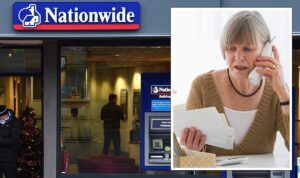Online banking WARNING: Stop doing this common habit to protect against credit card fraud
From transferring funds into a different account to keeping track of the balance, there are no shortage of reasons why a person may use online banking. And, with the possibility to shop online, entering their bank details on the internet is something many people do on a regular basis. Whether that’s for big spends such as holidays or low-cost purchases, there are many reasons for a person submitting their card information online. Now, the team at Credit Karma have shared some top tips for helping to keep one’s cards and identity secure.
According to Which?, credit card fraud accounts for 39 per cent of identity fraud cases in the UK.
However, there are steps which one can take in order to reduce the risk of it happening.
This includes avoiding entering sensitive information on public computers and WiFi, the credit specialists said.
While the access to public WiFi and WiFi in cafes may be convenient, they’re not always secure.
“It’s best to avoid using public networks when there is money involved,” Credit Karma said.
“Keep in mind that even if your WiFi is password-protected, passwords are often displayed publicly and are easy to obtain.”
If shopping online in public is a must, it could be worth considering a virtual private network (VPN) service to protect the user against unwanted data collection, they said.
Another top tip is to use credit cards rather than debit cards for online purchases, where possible.
“If your credit card issuer or favourite online retailer offers a two-factor verification process, it’s best to utilise it,” Credit Karma said.
“And generally speaking, it’s better to use a credit card for online purchases than a debit card.
“That way, if your account is hacked, you’re merely waiting for the card issuer to restore a line of credit – and not missing cash as you would from a savings account.”
One recommendation is taking advantage of security settings which may be linked to the bank’s app or one’s pone.
“This can include setting up real-time spending alerts, enabling location security, disabling magstripe payments and freezing the card immediately if it’s been hacked.
“Remember that the faster you report a loss the better, so be sure to keep a constant eye on transactions.
“If you don’t want to set up phone alerts then be sure to check your bank statements every few days and question any transactions you don’t recognise as soon as possible.”
It may also be a good idea not to store credit card and CVV numbers on online retail account – a tip which is echoed by an expert on information security.
You may be interested

You can easily disassemble this repairable smartwatch using just a Phillips screwdriver
admin - Nov 22, 2024[ad_1] The Spectra is a new smartwatch designed from the ground up to be hackable and easy to repair. It…

Ed Sheeran 'helped Ipswich sign player' before appearing with Taylor Swift
admin - Nov 22, 2024[ad_1] Ed Sheeran helped Ipswich Town to sign a player over the summer just before getting on stage with Taylor…

Strava closes the gates to sharing fitness data with other apps
admin - Nov 20, 2024[ad_1] We wanted to provide some additional context around the changes to our API Agreement and the impact for our…
Leave a Comment
You must be logged in to post a comment.


























